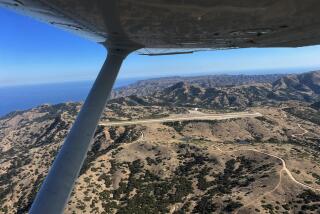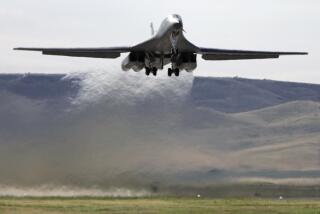Pilot in Denver Air Crash Had Failed 3 Flight Exams
- Share via
WASHINGTON — The pilot of a Continental Airlines jet that crashed last November had a poor training history and had been fired from a previous job after failing his flight exam three times, a federal investigation disclosed today.
The experience of the 26-year-old pilot as well as questions about whether his aircraft had taken off from Denver, where it crashed last November, with ice on the wings emerged as the focus of the federal investigation into the crash that killed 28 of the 82 people aboard, including the pilot and captain.
The National Transportation Safety Board was expected to issue a probable cause for the Nov. 15, 1987, accident later in the day.
But during a public hearing in which the final wording of the report was being worked out, investigators focused on the experience of Lee Bruecher, who was piloting the McDonnell Douglas DC-9 when it crashed in a snowstorm. Bruecher was the flight’s first officer.
Only 36 Hours of Jets
Most airlines regularly have the captain and first officer, or co-pilot, trade off in taking control of the plane during different flight segments. But since the Denver crash, many, including Continental, have the flight captain at the controls during the takeoff.
According to the investigation, Bruecher, who had only 36 hours of flying jet aircraft and had never flown the DC-9 in snowy weather, had had training problems with propeller aircraft before coming to Continental in the summer of 1987.
In 1985, he was fired by an air taxi company after failing three times to pass his flight examination on a propeller plane despite 30 hours of training, according to investigators. His examiner told the NTSB that other pilots passed the exam after only half that much training and that Bruecher had “chronic troubles,” became disoriented and seemed “unable to cope with deviations from the routine.”
‘Behind the Airplane’
A year later while at Rio Airlines, a Texas commuter carrier, Bruecher failed a flight check for a more advanced aircraft and was described by the examiner as being “behind the airplane.”
After Continental Airlines hired Bruecher in July, 1987, he also encountered difficulties during several sessions of his formal simulator training for operating jet aircraft. During one session in the simulator he “completely lost control of (the) aircraft with engine out at 2,000 feet,” said one Continental training report, according to the NTSB.
More to Read
Sign up for Essential California
The most important California stories and recommendations in your inbox every morning.
You may occasionally receive promotional content from the Los Angeles Times.









